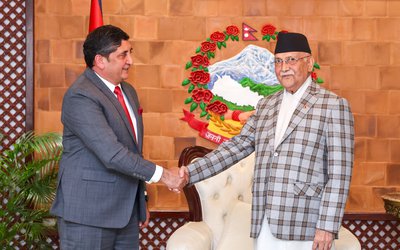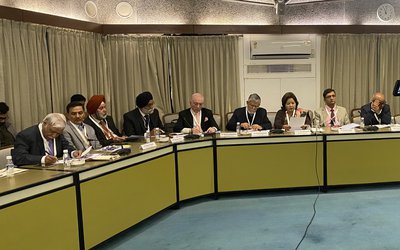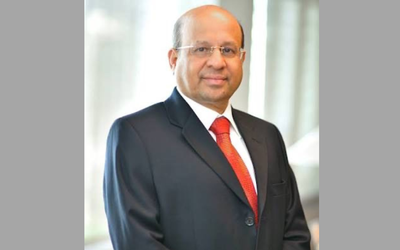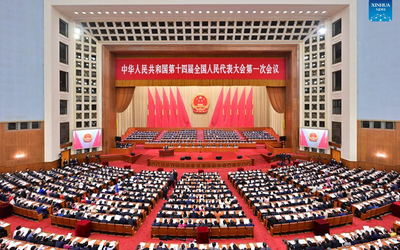
For over seventy years, presidents and parties come and go in the United States, what has not changed is its policy towards Nepal. However, there are many liberal Nepalese who see the victory of Joe Biden will be a great sleigh of relief.
“The policy of the United States towards Nepal always remains the same whether it is under Democratic-led president or Republican. Similarly, there will be a little change,” said Dr. Shankar Sharma, former ambassador of Nepal to the United States of America. Since the establishment of bilateral relations between the two countries, the United States has been providing technical and financial support in Nepal’s development sector.”
With almost 100,000 people of Nepali origin in the United, there was wide and intense enthusiasm in Nepal over the US presidential race. Thus, the concern was high. Similarly, the large numbers of Nepalese students still choose the United States as the first preference for their higher education. Similarly, the DV lottery winners also watch the election results hoping to get entry.
At the state level, Nepal and United States contact was made during the visit of Jung Bahadur Rana to England. It was the time that Nepal’s state knew about the United States.
After the establishment of diplomatic relations between the two countries in 1947, Nepal and the United States have started their journey of friendship. Since Nepal and United States technical assistance in 1951, Nepal started to receive assistance under the Point IV program. Since then whichever political party in power in the United States, Nepal continues to receive technical and financial support in various sectors. In this regard, the United States' contribution to Nepal’s transformation in health, education, transport, governance sector, forest-agriculture remains immense.
“If we see the past over 70 seventy years long history, there is no major policy shift towards Nepal. I think the policy towards Nepal will remain the same even during the period of new president Biden.”
At the global level implications
The anti-democratic spirit of Trump's destruction has not disappeared with Biden's victory. Domestically, the US is facing difficult times. But its foreign policy is becoming increasingly predictable, says Ines Pohl in DW, a German news agency.
“Large parts of the world held its breath. And now, it can slowly exhale — and breathe in again. It has taken a long time, and it was close, but Joe Biden has emerged victorious over Donald Trump. After only one term in office and four long years, the incumbent president must leave the White House on January 20. On that same day, Biden and Kamala Harris will be sworn in as president and vice president. Trump might have announced that he will challenge the result in the courts — even so, he should not stand a chance.”
Back to the Paris Agreement
Biden is, like Obama whom he served as vice president, an ardent supporter of the trans-Atlantic relationship. He treasures Germany and Europe as reliable partners. He has promised to rejoin the 2015 Paris agreement on climate change and to continue to meet the obligations of other multilateral alliances such as NATO.
Under President Biden, the US will once again become a dependable partner.
A trail of destruction
Viewed domestically, the 2020 election can be evaluated significantly less positively. Trump has left a trail of disruption. His leadership with targeted lies has damaged the trust in democratic processes and institutions in the long term, and many Trump voters will continue to maintain that the election results were manipulated.
Trump supporters will hold Biden responsible for the economic faults that the US will have to contend within the coming months, if not years — even if Trump is in part responsible for the consequences of the COVID-19 pandemic. In the four years of his time in office, Trump has changed the country. The Democrats had hoped a landslide victory would indicate that a clear majority wanted a different course. But the close race shows this isn't the case.
Biden’s Asia-Pacific Policy
In phone calls with the leaders of South Korea, Japan and Australia, Biden has discussed the challenges key allies face. But the main power in region, China, continues to refrain from congratulating the president-elect.
US President-elect Joe Biden reaffirmed his country’s commitment to key US allies in the Asia-Pacific on Thursday.
In separate calls with South Korean President Moon Jae-in, Japan’s Yoshihide Suga and Australian Prime Minister Scott Morrison, Biden discussed the importance of bilateral relations in tackling key global challenges like the coronavirus pandemic and climate change.
During his conversation with Japanese Prime Minister Suga, Biden highlighted the need to work together in order to achieve "a free and open Indo-Pacific," possibly an indication that the Biden administration will move to control China's growing military and economic overtures in the region.
Australia's Scott Morrison took to Twitter to say, "There are no greater friends and no greater allies than Australia and the US."
India’s overtures
Despite his close relationship with President Donald Trump, Indian Prime Minister Narendra Modi became one of the first international leaders to congratulate Biden on his victory on Sunday, hours after it became clear that the Democratic candidate had the electoral college seats to win the presidential election.
"Congratulations @JoeBiden on your spectacular victory! As the VP, your contribution to strengthening Indo-US relations was critical and invaluable. I look forward to working closely together once again to take India-US relations to greater heights," Modi said on Twitter.
He also congratulated Vice President-elect Kamala Harris, highlighting her Indian roots. Harris, the first female vice president-elect of the US, is of Indian and Jamaican descent.
China’s reluctance
Even as US allies in Asia reached out to the president-elect, China has said it would withhold comment on the US election results until all legalities have been formalized.
"We noticed that Mr. Biden has declared election victory," China's foreign ministry spokesman Wang Wenbin told a media briefing. "We understand that the US presidential election result will be determined following US law and procedures."
China joins a short list of nations, including Russia, Brazil and Mexico, who have been a bit more cautious by holding off their congratulations for the moment.
With input from DW
- SWISS SUPPORT: Construction Of A Trekking Trail In Koshi
- Dec 19, 2024
- PM OLI'S VISIT TO CHINA: BRI Agreement
- Dec 16, 2024
- RASUWAGADHI AND SANJEN: Begin Generation
- Dec 03, 2024
- NEPAL, INDIA ELECTRICITY TRADE Nepal's Advantage
- Dec 02, 2024
- PM Oli'S VISIT TO CHINA: Nepal's Dilemma
- Dec 01, 2024
















